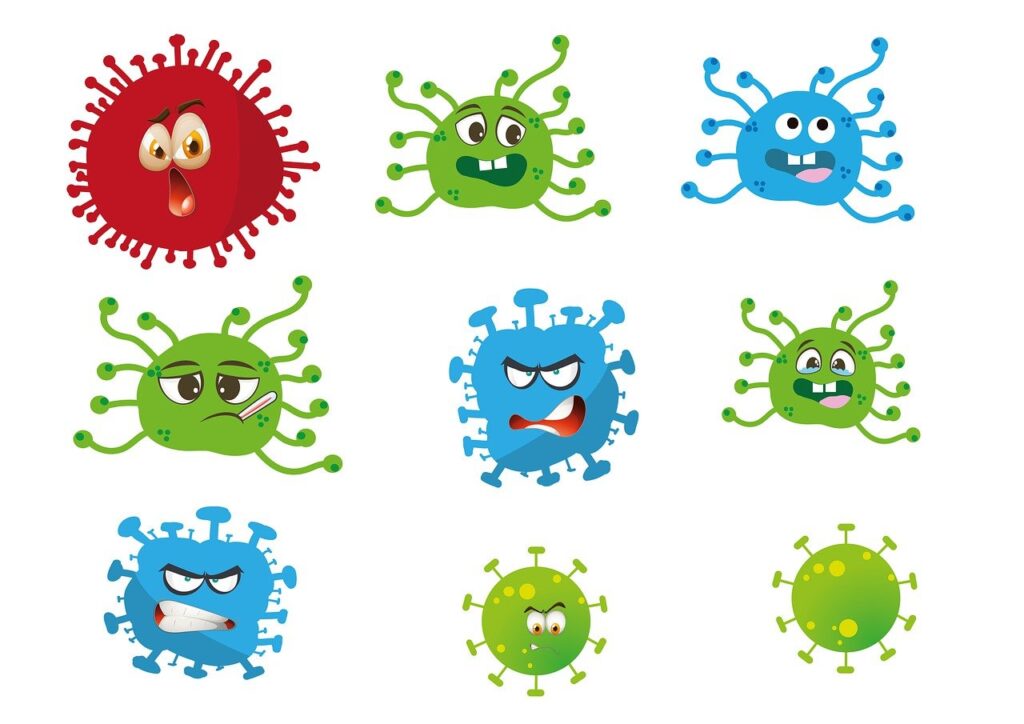The immune system is your body’s defense force against harmful invaders like bacteria, viruses, fungi, and toxins.
Table of Contents
The immune system comprises an extensive network of organs, white blood cells, proteins, and various chemicals. These components collaborate to safeguard the body against pathogens and other harmful entities. Additionally, the immune system plays a crucial role in facilitating recovery from infections and injuries. It serves as the body’s primary defense mechanism against intruders such as germs, helping to prevent illness and supporting the healing process during times of sickness or injury. To enhance the effectiveness of your immune system, it is beneficial to consume a balanced diet, engage in regular physical activity, and ensure adequate rest.

What is the immune system?
The immune system serves as the body’s protective framework against harmful agents, including bacteria, viruses, fungi, and toxins. It consists of a variety of organs, cells, and proteins that collaborate to detect and eliminate these threats. A well-functioning immune system is capable of differentiating between the body’s own healthy tissues and external invaders.
There are two primary components of the immune system:
Innate Immune System: This component acts as the body’s initial defense mechanism, present from birth. It offers a broad, non-specific response to pathogens, including physical barriers like the skin, chemical defenses such as stomach acid, and immune cells that target invaders. Imagine your child’s body as a well-guarded fortress. The innate immune system serves as the vigilant sentry, always on the lookout for unwelcome intruders. From the moment your child is born, this system stands ready to defend against harmful germs, parasites like worms, and even rogue cells such as those that can lead to cancer.
This frontline defense is composed of physical barriers: the skin, the clear covering over the eyes known as the cornea, and the mucous membranes lining the respiratory, digestive, and urinary tracts. These barriers act as sturdy walls and protective moats, preventing invaders from entering the body’s inner sanctum.
When a potential threat breaches these defenses, the innate immune system springs into action without hesitation. Specialized cells, known as phagocytes, rush to the invasion site, enveloping and neutralizing the intruders to keep your child safe and healthy.
In essence, the innate immune system is your child’s immediate response team, tirelessly working from birth to shield them from a myriad of health threats.
Adaptive (Acquired) Immune System: This system evolves as individuals encounter diseases or receive vaccinations. It delivers a precise response to specific pathogens and retains a memory of these encounters, allowing for faster and more effective responses during future exposures.
Key elements of the immune system include:
White Blood Cells (Leukocytes): These cells travel through the bloodstream and lymphatic system, identifying and eliminating pathogens.
Antibodies: These are proteins generated by B cells that specifically recognize and attach to foreign substances, signaling them for destruction.
Lymphoid Organs: These include structures such as the thymus, spleen, and lymph nodes, which are responsible for producing, storing, and activating immune cells.
Maintaining a robust immune system is essential for overall health. Factors such as a nutritious diet, regular physical activity, sufficient sleep, and effective stress management significantly contribute to immune function.
It is crucial to recognize that while a properly functioning immune system defends against numerous illnesses, an overactive or misdirected immune response can result in autoimmune diseases, wherein the body mistakenly attacks its own tissues.
What does the immune system do?
The immune system functions as the body’s protective mechanism against detrimental agents, such as bacteria, viruses, fungi, and toxins. It plays a crucial role in identifying and neutralizing these threats, thereby preserving overall health and wellness. Furthermore, the immune system is adept at differentiating between the body’s own healthy cells and external substances, which is vital for the smooth operation of internal processes.
Key roles of the immune system encompass:
Preventing Pathogen Entry: Serving as a barrier to prevent the infiltration of harmful microorganisms into the body.
Detecting and Eliminating Threats: Recognizing and eradicating harmful entities that breach the body’s defenses.
Mitigating Damage: Minimizing the impact of invaders that succeed in entering the body.
Facilitating Tissue Healing and Repair: Assisting in the recovery of injured tissues to restore normal functionality.
Adapting to Emerging Threats: Modifying responses to identify and tackle new challenges and dangers.
Maintaining a strong immune system is crucial for warding off infections and diseases, as well as for enhancing overall health. Elements such as a nutritious diet, consistent physical activity, sufficient sleep, and effective stress management are vital in bolstering immune performance.
In conclusion, the immune system is a sophisticated network that protects the body from harmful invaders, aids in tissue repair, and adapts to new health challenges, ensuring that the internal environment remains stable and safeguarded.
Weak immune system..
Various factors can compromise your immune system, increasing your vulnerability to infections. Congenital conditions are less prevalent compared to those that arise later in life, such as Type 2 diabetes and cancer.

Hyperactive immune system
Conversely, your immune system may respond excessively to threats, whether they are genuine or imagined. It might initiate a defense response in the absence of an actual threat or continue its attack even after the invader has been eliminated. An overly active immune system can result in issues such as autoimmune disorders or allergic reactions.
How do antibiotics help fight infections?
Antibiotics serve to assist your child’s immune system in combating bacterial infections. However, they are ineffective against infections caused by viruses. These medications were specifically designed to eliminate or inhibit certain bacteria. Consequently, an antibiotic effective for a skin infection caused by one type of bacteria may not be suitable for treating diarrhea caused by another. The inappropriate use of antibiotics for viral infections or the selection of an incorrect antibiotic for a bacterial infection can lead to the development of antibiotic resistance, diminishing their effectiveness in the future. It is crucial to adhere to the prescribed dosage and duration of antibiotic treatment. Premature cessation of antibiotics may allow bacteria to develop resistance, potentially resulting in a recurrence of the infection that is more challenging to manage.
Most cases of colds and acute bronchitis do not respond to antibiotic treatment. To mitigate the spread of more virulent bacteria, it is advisable not to request antibiotics from your child’s healthcare provider in these situations.
Tips for immune-boosting foods or stress-reduction techniques!
Immune-Boosting Foods & Stress Reduction: Evidence-Based Strategies
I. Immune-Boosting Foods: Science-Backed Superstars
Your immune system relies on specific nutrients to function optimally. Here’s what to eat and why:
1. Vitamin C-Rich Foods
- Why: Stimulates white blood cell production and acts as an antioxidant.
- Foods:
- Citrus fruits (oranges, grapefruit)
- Bell peppers (red peppers have 3x more vitamin C than oranges)
- Kiwi, strawberries, broccoli
- Research: A 2017 Nutrients study found vitamin C reduces cold duration by 8% in adults.
2. Zinc-Powered Foods
- Why: Critical for immune cell development and fighting infections.
- Foods:
- Oysters (highest natural source)
- Pumpkin seeds, lentils, chickpeas
- Grass-fed beef (in moderation)
- Research: A 2020 BMJ meta-analysis showed zinc lozenges reduce viral respiratory infections by 33%.
3. Vitamin D Sources
- Why: Regulates immune responses and reduces inflammation.
- Foods:
- Fatty fish (salmon, mackerel)
- Egg yolks, fortified mushrooms
- Sunlight: 15–20 mins/day (triggers vitamin D synthesis)
- Research: Low vitamin D levels correlate with higher COVID-19 severity (PLOS ONE, 2021).
4. Probiotics & Fermented Foods
- Why: 70% of immune cells live in the gut. Probiotics boost gut barrier function.
- Foods:
- Greek yogurt (unsweetened)
- Kimchi, sauerkraut, kefir
- Miso soup, kombucha
- Research: A 2021 Cell study found probiotics increase antibody production by 60%.
5. Antioxidant-Rich Superfoods
- Why: Combat free radicals that weaken immunity.
- Foods:
- Turmeric (add black pepper to boost absorption)
- Berries (blueberries, elderberries)
- Dark chocolate (70%+ cocoa)
- Green tea (rich in EGCG, a potent antioxidant)
- Research: Curcumin in turmeric reduces inflammation markers by 25% (Journal of Medicinal Food).
Sample Immune-Boosting Meal Plan
- Breakfast: Greek yogurt + mixed berries + chia seeds
- Lunch: Spinach salad with salmon, bell peppers, and olive oil
- Snack: Handful of almonds + green tea
- Dinner: Turmeric-spiced lentil soup + steamed broccoli
II. Stress Reduction Techniques: Calm Your Mind, Strengthen Immunity
Chronic stress suppresses immune function by raising cortisol. Try these science-backed methods:
1. Mindfulness Meditation
- How: Lowers cortisol by 20% and reduces inflammation.
- Practice:
- 10 mins/day using apps like Headspace or Calm.
- Focus on breath or body scans.
- Research: A 2022 JAMA study found meditation boosts antibody response to vaccines.
2. Nature Therapy (“Forest Bathing”)
- How: Phytoncides (plant chemicals) boost NK cell activity by 50%.
- Practice: Spend 20 mins/day in green spaces.
- Research: A 2021 Environmental Research study linked nature exposure to higher white blood cell counts.
3. Progressive Muscle Relaxation (PMR)
- How: Reduces muscle tension and anxiety.
- Practice:
- Tense/release muscle groups from toes to head.
- YouTube guided PMR sessions (free).
4. Laughter Therapy
- Why: Laughter increases infection-fighting antibodies by 14%.
- Practice: Watch comedies, attend improv classes, or try laughter yoga.
5. Sleep Optimization
- Why: During sleep, cytokines (infection-fighting proteins) are released.
- Tips:
- Aim for 7–9 hours nightly.
- Keep bedroom cool (60–67°F / 15–19°C).
- Avoid screens 1 hour before bed.
III. Bonus: Daily Immune-Stress Routine
- Morning: 10-min meditation + green tea with lemon.
- Afternoon: Walk in nature + handful of walnuts (omega-3s).
- Evening: Turmeric ginger tea + 8 hours of sleep.
Key Takeaways
- Foods to Prioritize: Vitamin C, zinc, probiotics, antioxidants.
- Stress-Busters: Meditation, nature time, laughter, sleep.
- Synergy: Pairing nutrition with stress reduction boosts immunity more than either alone.
Immune System FAQ: Understanding the “Why” and “How”
1. Why is the immune system important?
Answer:
The immune system is your body’s defense force against harmful invaders like bacteria, viruses, fungi, and toxins. Without it, even minor infections could become life-threatening. It also:
- Identifies and neutralizes pathogens.
- Remembers past threats for faster future responses.
- Helps heal damaged tissues.
2. How does the immune system work?
Answer:
Your immune system operates through two main branches:
- Innate Immunity (First Response):
- Physical barriers (skin, mucous membranes).
- White blood cells (neutrophils, macrophages) that attack invaders.
- Inflammation to isolate threats.
- Adaptive Immunity (Targeted Defense):
- T-cells and B-cells create antibodies tailored to specific pathogens.
- “Memory cells” remember past infections for faster future responses.
3. Why do some people get sick more often?
Answer:
Factors that weaken immunity include:
- Poor diet (lack of vitamins like C, D, zinc).
- Chronic stress (elevated cortisol suppresses immune function).
- Sleep deprivation (reduces infection-fighting cells).
- Underlying conditions (e.g., diabetes, autoimmune disorders).
- Age (children and seniors have less robust immunity).
4. How can I boost my immune system?
Answer:
Strengthen immunity through lifestyle habits:
- Eat nutrient-dense foods: Citrus fruits, garlic, spinach, nuts, and probiotics (yogurt, kimchi).
- Stay active: Moderate exercise increases circulation of immune cells.
- Sleep 7–9 hours nightly: Critical for immune cell regeneration.
- Manage stress: Yoga, meditation, or deep breathing reduces cortisol.
- Avoid smoking/alcohol: Both impair immune responses.
5. Why does stress weaken the immune system?
Answer:
Chronic stress triggers:
- Cortisol release: Suppresses white blood cell production.
- Inflammation: Long-term inflammation harms healthy cells.
- Poor lifestyle choices: Stress often leads to unhealthy eating, smoking, or sleeplessness.
6. How do vaccines help the immune system?
Answer:
Vaccines train your immune system to recognize threats:
- Exposure to harmless antigens (e.g., weakened viruses).
- Memory cells are created to fight future infections faster.
- Herd immunity protects vulnerable populations when most people are vaccinated.
7. Why is gut health linked to immunity?
Answer:
70% of immune cells reside in the gut! A healthy gut microbiome:
- Produces antibodies and short-chain fatty acids.
- Blocks harmful pathogens from entering the bloodstream.
- Fix it: Eat fiber-rich foods (vegetables, whole grains) and fermented foods (kefir, sauerkraut).
8. How does aging affect the immune system?
Answer:
As we age, immunity declines due to:
- Thymus shrinkage: Produces fewer T-cells.
- Slower response: Memory cells forget some pathogens.
- Chronic inflammation: Weakens defenses over time.
Solution: Prioritize vaccines, balanced nutrition, and regular checkups.
Immune System FAQ: How & Why It Protects You.
Why do I need an immune system?
Answer:
Your immune system acts like a 24/7 security system, protecting you from harmful invaders and internal threats. Without it, even minor infections could overwhelm your body, and damaged cells (like cancer) could grow unchecked.
2. How does my immune system keep invaders out?
Answer:
It uses physical and chemical barriers:
- Skin: Acts as armor against germs.
- Mucous membranes: Trap pathogens in areas like your nose and throat.
- Stomach acid: Destroys harmful microbes in food.
- Coughing/sneezing: Forcefully expel invaders.
3. How does it destroy invaders that get inside?
Answer:
Your immune system deploys specialized cells and proteins:
- White blood cells (neutrophils, macrophages) engulf and digest germs.
- Natural Killer (NK) cells destroy infected or cancerous cells.
- Antibodies tag pathogens for destruction.
- Inflammation isolates infected areas, preventing spread.
4. How does it limit harm from invaders?
Answer:
- Containment: Walls off infected areas with inflammation.
- Temperature control: Fever slows pathogen growth.
- Targeted attacks: Immune cells focus on infected cells to spare healthy ones.
5. How does the immune system heal damage?
Answer:
- Repair proteins: Like cytokines, which promote tissue regeneration.
- Stem cells: Replace damaged cells in skin, organs, and blood.
- Collagen production: Mends wounds and scars.
6. How does it adapt to new threats?
Answer:
- Memory cells: After fighting a pathogen, T- and B-cells “remember” it for faster future responses.
- Diversity: Your immune system can recognize millions of unique threats.
- Vaccines: Train your immune system to recognize weakened or dead pathogens.
7. What invaders does it protect me against?
Answer:
Your immune system battles:
- Bacteria (e.g., strep throat, E. coli).
- Viruses (e.g., flu, COVID-19).
- Fungi (e.g., athlete’s foot, yeast infections).
- Parasites (e.g., malaria, tapeworms).
- Cancer cells: Identifies and destroys abnormal cells.
8. Why does the immune system sometimes fail?
Answer:
- Overreaction: Allergies or autoimmune diseases (e.g., lupus) occur when it attacks harmless substances or your own cells.
- Undetected threats: Some pathogens (e.g., HIV) hide from immune cells.
- Weakness: Poor nutrition, stress, or aging can reduce its effectiveness.
How to Support Your Immune System
- Eat well: Focus on zinc (nuts), vitamin C (citrus), and protein.
- Sleep 7–9 hours: Immune cells regenerate during sleep.
- Stay active: Exercise boosts circulation of immune cells.
- Avoid smoking/vaping: These damage protective barriers in lungs.
Key Takeaways
- Your immune system is a multi-layered defense network.
- It works nonstop to block, destroy, and remember threats.
- Support it through healthy habits—it’s your best shield against disease!





